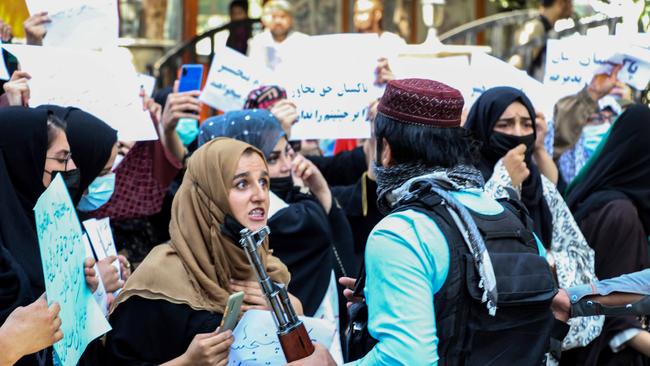
After two decades of being told to seize their right to education, to work, to play sport, to be counted, Afghan women and girls — a full 18 million people — are again to be oppressed at the point of a gun, forbidden to work, to play sport, to show their faces, to have a say.
Western nations left them to this fate without bothering to extract anything more than deliberately ambiguous undertakings from their notorious oppressors.
Afghan women warned for years that their hard-won rights would be the first bargaining chip tossed on the negotiating table.
Millions of Afghans will suffer Taliban rule, but none more so than women and girls.
Joe Biden has said America did not enter Afghanistan to secure their rights.
That’s not true.
The Bush administration clearly cited their oppression as one justification for the Afghan invasion, wheeling then first lady Laura Bush out on November 17, 2001 to make the case in a radio address to the nation. “The fight against terrorism is also a fight for the rights and dignity of women,” she told the American public.
Where is our outrage now? After all we have invested, how could we not believe it was worth staying long enough to help secure their rights instead of paving the way for a total Taliban victory, and no reason to compromise?
To those inclined to point-score off this mass suffering, who ask what happened to the voices of Western feminists: What happened to all those “fathers of daughters?”. We are all complicit, including those of us who championed Afghanistan’s “firsts”; its first female boxer, female cyclists, women’s soccer team, female judges, the first women in cabinet.
Women and girls suffer grave injustices in many countries, and the awful truth is we cannot save them all. But Afghanistan is a country in which the US, with the assent of its partners, explicitly tied the routing of terrorism to the liberation of women and girls.
It is domestic politics that drove us out again, and once the US made up its mind to go the collective will to stay collapsed.
Now, Biden says limply: “The world is watching.” Those words have played on endless loop this year since the Myanmar military drove its tanks over that country’s nascent democracy, and turned its guns on its people.
What they really mean is the world is watching on. In Afghanistan, the world has watched as thousands of families jammed up against airport walls, desperate to escape the fate Western countries abandoned them to, having reassured themselves they had done what they could to prevent it.
We watched children raised over those walls, youths fall from the sky. This week we have watched women and men beaten in the streets by antediluvian thugs for demanding the right to live with basic rights and dignity, a young woman staring right down the barrel of a gun and shouting “freedom”.
What we don’t see are the night arrests of those same women, the women and girls pulled out of their homes as spoils of victory, or the millions of conversations behind closed doors in which fearful families ask their wives and daughters to stay home for their own safety. That’s how this ends. Australia “saved” 3500 people from this fate, the US 123,000 — taking credit for the evacuation efforts of all nations.
Now that we have apparently done our share, talk has already turned to “irregular refugees”, as though there is no connection between our own actions and the horror scenes we now witness.
Soon enough the world will have seen all it can stomach and will look away, finding the viewing all too painful.
And then what?




“We don’t consider them half” of society, a Taliban spokesman said when asked in a televised interview why women — who represent half of the population — should not be in its new government. “Over the last 20 years, whatever was said by the media, the US and its puppet government in Afghanistan, was it other than prostitution in offices?”